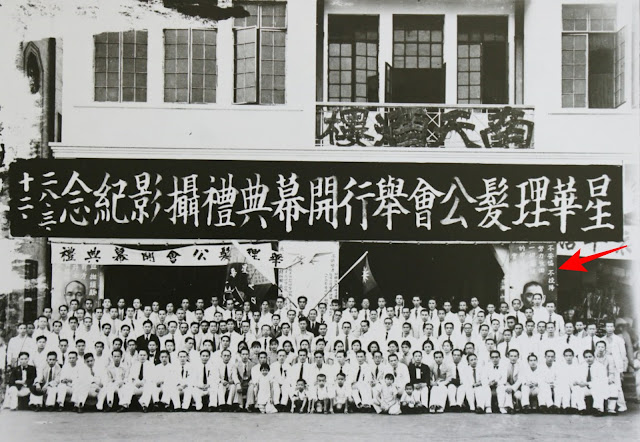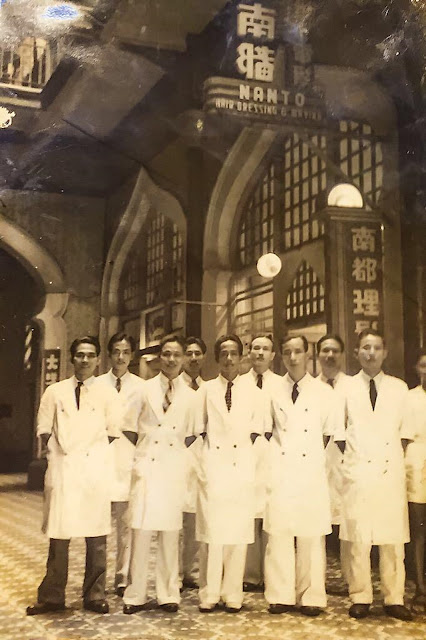This article is translated from 李国樑,《理发也筹赈---二战前后的男士理发业》published in Lianhe Zaobao, 24 February 2022.
At
the beginning of the 21st century, $10 quick cuts were introduced from Japan.
Some men hopped in to try out the new trend that turned away from tradition.
Today there are no less than 100 echouse, QB House and Kcuts unisex haircutting
outlets in Singapore.
The
traditional men's 'full course' haircutting takes more than an hour, including
shampooing, ear-picking, nose-hair trimming, shaving, facial compresses and shoulder
massage. Indian barbershops do not touch the ears or nose, but rather win over customers
with their unique technique of 'necks and shoulders loosening'.
In
contrast, contemporary fast-cutting shops take only 10 minutes. They are clean,
hygienic and do not perform anything additional other than haircuts. They are
forcing traditional barbershops to the end of the road in the face of the Covid
pandemic.
The
Fuzhou barber's razor
Before
Singapore's independence, the Chinese male hairdressing industry was mainly run
by the Hainanese, Cantonese, Henghua and Fuzhou people. There was a popular
saying about ‘Fuzhou men’s three knives’: the kitchen knife of a cook, the
scissors of a tailor and the razor of a barber.
Through
James Lau (a retired civil engineer who managed the OCBC and UOB construction
projects), who is in his 80s, recapturing the life of his father, and complemented
by recordings and old newspapers, it is possible to retrace the lost time of
the yesteryears through the eyes of the men's hairdressing industry.
Growing
up in China during the warlord era, Liaw Ching Sing took a boat from Fuzhou to
Xiamen and board a steamship to Singapore. He described the Singapore’s street
scene as "mostly bullock carts, horse carts and rickshaws". He was 19
years old then.
Not
every Fuzhou master brought his special razor skill to the South. Anyway the skill
for trimming a man's hair was not too demanding in that era. A pair of steady
hands was the key. Liaw passed all the
three levels within a week and served as a full-fledged barber. The first level
was to treat a soft drink bottle as a human head, practising until the scissors
did not cut the comb and the comb did not touch the glass bottle. The second
level was to practise trimming along the inner edge of the bottle. The third level
was to master the skills of the razor by shaving own feet until the skin did
not turn red or bleeding.
Changes
before and after the Second World War
In
early 20th century, the Cantonese and Hokkien had already established their own
barber trade associations. As barbershop owners were also wage earners, memberships
of the barber trade associations were
jointly subscribed by owners and workers.
About six months after the founding of the Singapore China Relief Fund Committee (SCRFC), the Hainanese established the Singapore Chinese Barber Association for barbers of all dialect groups. The slogan "no compromise, no surrender, strive to recover all the fallen Chinese lands and achieve national liberation" can be seen in the commemorative photo taken outside the Great Southern Hotel (南天酒楼). It clearly showed that the barbers were just as indignant as the other local Chinese at the time and had never forgotten their national hatred.
The
slogan "no compromise, no surrender, strive to recover all the fallen
Chinese lands and achieve national liberation" can be seen in the
commemorative photo taken outside the Great Southern Hotel (南天酒楼)
After
Singapore changed its name to Syonan-to, the Japanese military government
ordered the barbers to resume work. The military government selected the best
barbershops in terms of size and hygiene as the appointed shops. Liaw’s Nando
Barbershop, located in The Arcade opposite the Clifford Pier, was chosen by the
military government.
The
barbershop was frequented by many Japanese soldiers. They were deployed to
other war zones later and Nando became quiet. However, the locals did not want
to cross the threshold and preferred to stay away from those appointed shops
including Nando.
Nando
Barbershop, located in The Arcade opposite the Clifford Pier, was chosen by the
military government. Liaw is the 3rd left of the front row
At
the end of the Second World War, members of the Malayan People's Anti-Japanese
Army (MPAJA) returned to Singapore. Many barbers were MPAJA partisans and
played a key role in reshaping the barber trade. Two important reforms were
introduced to improve the quality of life for the barbers: Firstly, the opening
hours were reduced by four hours from 7am to 5pm, All barbers will have one day
off each week. Obviously, the working hours
was much better than before of which only having the Lunar New Year off. Secondly,
the monthly salary was replaced by a shared-income system. Considering the
owner must pay for the shop rental, utilities and barbering tools, the owner
and the staff would split in 30/70, while a poorly equipped barbershop would
split in 20/80. If the owner provided
food it would be 50/50.
In
1948 when the Emergency Ordinance was declared in Malaya and Singapore, the
joint workers' and employers' associations were ordered to dissolve. The
Hokkien Barber Association, of which Liaw was a member, was replaced by the
employer-based Singapore Barber Association. As the head of the association,
Liaw often spent more time holding meetings, setting rules for the trade and resolving
labour disputes than taking up the razor.
Fierce
competition
In
the face of fierce competition, some owners deployed young female barbers to
attract customers. For instance, by the time James’ sister was 15 or 16 years
old, she was already wielding the scissors with ease and had become the
designated hair stylist for many of her regular customers.
According
to the Straits Times in 1949, young women accounted for one-third of the
approximately 2,000 barbers in Singapore. Indeed, many old thinking had changed
after the Second World War and women began to enter the workforce at a rapid
pace. Hairdressing, make-up, dressmaking, the police force, schools, offices
and rubber factories, all attracting a new generation of women.
In
the 1950s, when the barbers could not reach an agreement with their bosses,
they often resorted to the tactic of slacking off with the support of workers
from all wards. The supporting contingent took turns to crowd the shops, smoking
and chitchatting. The bosses were unable to carry out their usual business and
more often than not, had to return to the negotiation table.
Some
members violated the rules of the barber trade by reducing prices in order to
attract customers. When the association failed to persuade the members to stop
such practices, secret societies were hired and always proved to be effective.
Barbers
and cabaret girls join forces to raise war relief funds
In
the days of the anti-Japanese relief effort, Liaw teamed up with barbers in the
Jalan Besar area to form the China National Liberation Youth Group (中国民族振兴青年团).
The main activity was to mobilise young people to sell flowers. Liaw also acted
individually in the evenings to punish the "traitors" who sold
Japanese goods. Liaw was also one of the key members of the Second Special
District of the China Relief Fund Branch. Based at the shophouse on Foch Road, Liaw
was working with the Cabaret Girls' Association. The fund raised was particularly
impressive due to the presence of the New World cabaret girls and the
star-studded sisters Liang Sai Zhen (梁赛珍) and Liang Sai Zhu (梁赛珠).
The
Liang sisters were nicknamed the "Shanghai girls". Liang Sai Zhen,
the elder sister, became a popular actress in Shanghai at the same time as Ruan
Lingyu (阮玲玉). Liang Sai Zhu was introduced to the film
industry by her elder sister and acted in the film "The Four Sisters"
produced by Lianhua Co.. After the outbreak of the Sino-Japanese War, the two
sisters fled to Hong Kong and were subsequently hired as dance hostesses at the
New World Cabaret, Singapore. They worked with Huang Feng Yi (黄凤仪),
the chairperson of the Singapore Cabaret Girls' Association and the pillar of
the New World Cabaret, as well as other dance hostesses such as Chen Yu Lan (陈玉兰) and
Hua Yu Lan (花玉兰), to raise funds for the cause, including the
auction of dance tickets and jewelry, and charity performances of Cantonese
and Peking opera in Singapore, Penang and Kuala Lumpur. The cabaret girls, who worked
in the three worlds, were publicly praised by the Acting Chairman of the SCRFC,
Tan Ean Kiam, for their "tender heartedness in changing dependency and
worthy of the times".
The
three sisters: Liang Sai Zhen (梁赛珍) ,
Liang Sai Zhu (梁赛珠)
and Liang Sai Shan (梁赛珊)
The
patriotic film "Tears of War" (战云情泪),
co-starred by Liang Sai Chu, Ng Cho Fan (吴楚帆)
and Lu Dun (卢敦) in Hong Kong, was facing several twists and
turns in Singapore. Eventually it was allowed to be screened locally at the Overseas
Chinese Theatre (Siu Po) and Glorious Theatre (Happy World), as well as Shaw
Cinemas' Oriental Theatre (Tai Po) and Atlantic Theatre (Great World). Liang
played a part in boosting the popularity of the film for fund raising.
After
the fall of Singapore, key members of the Relief Committee were targeted for
prosecution. Liaw was imprisoned at the Siong Lim Sawmill Factory next to the
Rochor River. Three days later, Liaw took advantage of the fear of transmittable
disease of the Japanese Kempeitai and managed to escape by supporting his severely
injured comrade, who was nestled in a mass of houseflies on his inflamed
wounds. On the other hand, the last steamship, the Imperial Star, supposedly
ferrying women and children to Australia, was taken over by gun-wielding runaway
soldiers. Failing to board the last ship, the Liang sisters went into hiding in order to
save their own lives.
When
the end of Second World War finally dawned, Liang Sai Zhu involved in the charity
work of the Xing Hua Orphanage (星华孤儿院) and Liang Sai Zhen
became the manager of the Dragon and Phoenix Dance Palace in the Great Southern
Hotel. The barber and the New World cabaret girls had never forgotten each
other in the midst of the great era.



No comments:
Post a Comment